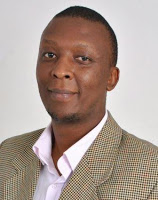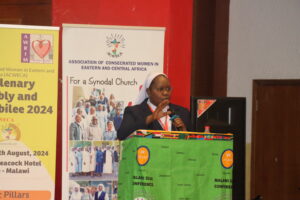AMECEA: Justice, Peace and Caritas to Review the Mining Study on Extractive Industry

 |
| Mr. Antony Mbandi, Coordinator AMECEA Justice, Peace and Caritas Department |
AMECEA
Justice Peace and Caritas Department is organizing a two-day meeting (16th
to 17th June 2015) in collaboration with Uganda Episcopal Conference
and Justice and Peace Department of the Archdiocese of Tororo to review the
research findings of a study conducted last year in dioceses within Kenya and
Uganda conferences.
Justice Peace and Caritas Department is organizing a two-day meeting (16th
to 17th June 2015) in collaboration with Uganda Episcopal Conference
and Justice and Peace Department of the Archdiocese of Tororo to review the
research findings of a study conducted last year in dioceses within Kenya and
Uganda conferences.
Speaking to AMECEA Online News, the AMECEA
Coordinator of Justice, Peace and Caritas Mr. Antony Mbandi said that the study
was necessitated by the need to better understand the experiences of local
communities in the mining regions as well as inform the conferences on areas
that need to be addressed by the church.
Coordinator of Justice, Peace and Caritas Mr. Antony Mbandi said that the study
was necessitated by the need to better understand the experiences of local
communities in the mining regions as well as inform the conferences on areas
that need to be addressed by the church.
He said the
study and the review workshop are being supported by the Catholic Agency for
Overseas Development (CAFOD); while participants of the review meeting will be
drawn from the Dioceses within Kenya and Uganda that are affected by mining.
study and the review workshop are being supported by the Catholic Agency for
Overseas Development (CAFOD); while participants of the review meeting will be
drawn from the Dioceses within Kenya and Uganda that are affected by mining.
Mr. Mbandi
said, the study entitled “Righting the Injustices in the Extractive
Industry”, took place over a period of six months. “Issues that are
likely to be discussed comprehensively over the two-day period include: The
need to implement robust procedures to consult with local people; decision making,
built on pillars of access to information; public participation and access to
justice.
said, the study entitled “Righting the Injustices in the Extractive
Industry”, took place over a period of six months. “Issues that are
likely to be discussed comprehensively over the two-day period include: The
need to implement robust procedures to consult with local people; decision making,
built on pillars of access to information; public participation and access to
justice.
According to
him this not only gives an opportunity to the public to make informed choices
and influence decisions, but also creates a stable and predictable investment
for business.
him this not only gives an opportunity to the public to make informed choices
and influence decisions, but also creates a stable and predictable investment
for business.
The second
thing is about the right to own land:
Recognizing the communities in both countries as distinct indigenous peoples
with rights to their lands and recognize their land rights over land
traditionally occupied and use.
thing is about the right to own land:
Recognizing the communities in both countries as distinct indigenous peoples
with rights to their lands and recognize their land rights over land
traditionally occupied and use.
The study
will also look into minimum standards in
impact assessments: “What do we recognize as minimum standards and how do
we entrench this within the mining laws,” he said.
will also look into minimum standards in
impact assessments: “What do we recognize as minimum standards and how do
we entrench this within the mining laws,” he said.
Another
thing is to look on how effective are the
legislative arms of governments?: There is need for the legislative arm of
government to look at Land Acts to make eligible broad social representation in
the composition of communal land associations in order to address a major
hurdle for registering certificates of customary ownership, which is common in
the region. It is also critical for the
law makers to stipulate how benefits accrued should be channeled to the local
communities.
thing is to look on how effective are the
legislative arms of governments?: There is need for the legislative arm of
government to look at Land Acts to make eligible broad social representation in
the composition of communal land associations in order to address a major
hurdle for registering certificates of customary ownership, which is common in
the region. It is also critical for the
law makers to stipulate how benefits accrued should be channeled to the local
communities.
The role of the Church will be another topic
of discussion. He said, The Church and other faith institutions clearly have a
sacred role to play in addressing the conflict and injustices to which mining
can contribute. They can help communities engage effectively in dialogue and
negotiations with governments and companies to ensure communities receive appropriate
benefits and they can use their influence to hold companies and governments
accountable when things go wrong. “Churches, and in particular the Catholic
Church, should take up this responsibility creating the very much needed
“bridge” between the communities, the private sector and the government. The question lingers, how this bridge should look
like?” he said.
of discussion. He said, The Church and other faith institutions clearly have a
sacred role to play in addressing the conflict and injustices to which mining
can contribute. They can help communities engage effectively in dialogue and
negotiations with governments and companies to ensure communities receive appropriate
benefits and they can use their influence to hold companies and governments
accountable when things go wrong. “Churches, and in particular the Catholic
Church, should take up this responsibility creating the very much needed
“bridge” between the communities, the private sector and the government. The question lingers, how this bridge should look
like?” he said.
Another
issue which Mr. Mbandi pointed out is the Judiciary. “What has been the role of
the judiciary and has it increased the helped in reducing the incidences of
injustices or increased them through the court processes,” he said.
issue which Mr. Mbandi pointed out is the Judiciary. “What has been the role of
the judiciary and has it increased the helped in reducing the incidences of
injustices or increased them through the court processes,” he said.
The last two
things will be on Mining Companies and the role of the Communities. On mining
Companies, Mr. Mbandi said that they are going to look on the good and bad
practices undertaken by the private sector? “How can we engage better for the
benefit of the communities?” he said while on the role of communities he said,
“Are communities really helpless? Is there a better way to engage with the
private sector and the governments especially on the accrued benefits of the
industry?”
things will be on Mining Companies and the role of the Communities. On mining
Companies, Mr. Mbandi said that they are going to look on the good and bad
practices undertaken by the private sector? “How can we engage better for the
benefit of the communities?” he said while on the role of communities he said,
“Are communities really helpless? Is there a better way to engage with the
private sector and the governments especially on the accrued benefits of the
industry?”
The review
meeting is expected to be graced by the Secretary General of Uganda Episcopal
Conference Msgr. Dr. John Baptist Kauta on 16th June 2015 for
official opening.
meeting is expected to be graced by the Secretary General of Uganda Episcopal
Conference Msgr. Dr. John Baptist Kauta on 16th June 2015 for
official opening.
Source: By AMECEA Online News
reporter
reporter


